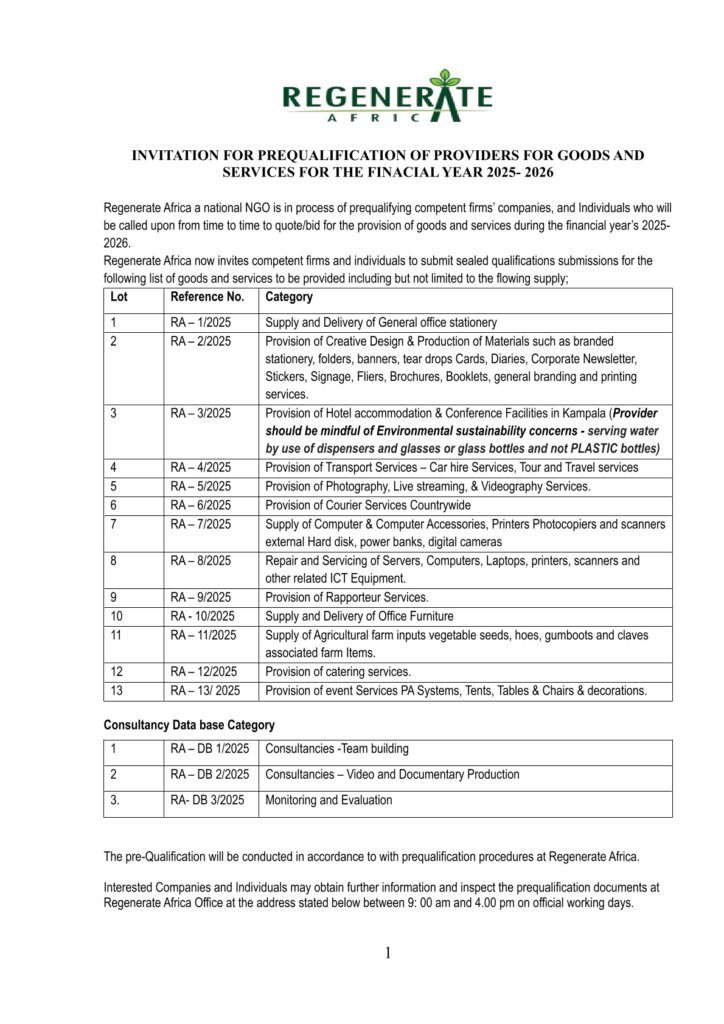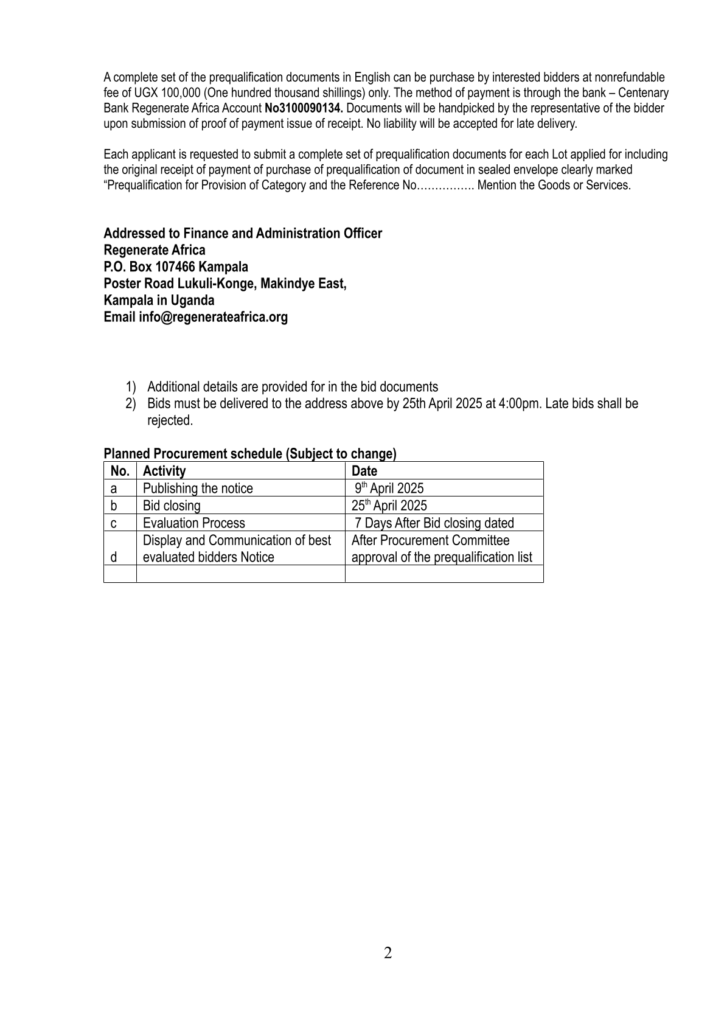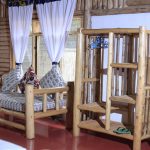

Regenerate Africa, invites qualified and competent providers to submit sealed bids for prequalification for the provision of goods, services, and consultancy for the financial year 2025–2026.
Deadline for Submission: 25th April 2025 at 4:00 PM EAT
Documents to be picked at Regenerate Africa Offices, Poster Road, Lukuli-Konge, Makindye East, Kampala at a non-refundable fee of UGX 100,000.
For more info, email: info@regenerateafrica.org
We are thrilled to share our Eastern Uganda Mining Sector Report, a comprehensive exploration of the region’s mineral wealth, operational capacities, and the critical role of the mining sector in advancing Uganda’s sustainable development and just energy transition.
This report, written by Dr Susan Nakanwagi, developed following the UCMP’s exclusive mineral excursion (October 3-5, 2024), highlights key environmental, social, and governance (ESG) challenges and opportunities. It also underscores the potential of critical minerals to power Uganda’s ambitions for low-carbon development pathways.
At Regenerate Africa, we are proud to collaborate with the Uganda Chamber of Mines and Petroleum (UCMP) under our MoU to drive sustainability and knowledge-sharing in the extractive sector. This report is another step in our joint mission to advance strategies, training, and innovations for a more sustainable future.
The project is located in Buikwe District, Ssi-Bukunja Sub-county, Zittwe Parish and Nalumuli Village. The site of the project the whole sub-county of Ssi-Bukunja which is one of the few sub-counties in the greater Mukono that still have significant natural forest cover which is largely owned and managed by private entities and individuals. The objective of this project is to “Quantify Tree Diversity, Carbon Stocks, and Carbon Sequestration Potential of Nalumuli forest”. The managers of this forest in partnership with Regenerate Africa, Solid Options Company Ltd andGreat Outdoors have agreed to have the 540 Acre (218.52 Ha) forest managed as a model privately owned natural forest. This forest is one of 13 privately owned natural forest parcels in the sub-county. Information obtained will be used to prepare management and conservation plan for the forest. The information will also be used to prepare a feasibility of encouraging sustainable management all forests and agricultural lands in Ssi-Bukunja Sub-county for generation of verifiable and certifiable ecosystem (biodiversity conservation, carbon sequestration, watershed, soil conservation and recreational) services.
The project has the following specific objectives:
- Determine baseline plant composition (trees, treelets, vines/climbers, shrubs, epiphytes and herbaceous vegetation (Bailey 2003)) diversity of Nalumuli forest
- Determine baseline forest/vegetation cover, biomass and forest carbon stocks including for Soil Carbon
- Label the selected and important trees, shrubs and climbers to support public appreciation of, and education on the value and importance of these plants and the forests that support them
Target Group and Beneficiaries
The project targets the farmers, protected area managers, private and public entities that own and or are managing forest and agricultural lands of Ssi-Bukunja in Buikwe district. The project will start with the inhabitants of Zittwe Parish and Nalumuli Village (1300 households). Later in the second phase the entire Ssi-Bukunja Sub county (about 8,000 Households) will be targeted and followed by the whole district.
The project geographical focus is in selected six (6) districts in Uganda i.e. 3 in the Lake Victoria Basin (i.e. Mukono, Buikwe and Kayunga) and 3 in the Mt. Elgon Region i.e. Bukwo, Kapchorwa, and Kween
The project objective is, ´´to enhance small scale coffee farming communities’ resilience to climate shocks and stresses and increase benefits to communities from coffee, multiple-use trees and other crops in targeted regions.´´ The project will contribute towards achievement of the Government of Uganda commitments in respect to increasing coffee production and productivity at farm level in a sustainable way that addresses the social, ecological and economic dimension. Furthermore, to promote the environmental and biodiversity conservation practices in the coffee contributes towards implementation of Government of Uganda priorities as stipulated in the Vision 2040, Uganda Green Growth Strategy, National Development Plan, Climate Change Policy and its Nationally Determined Contributions (NDC), Energy Policy and National Forest Policy.
Overall, the project’s long-term impacts is, ´´A resilient and productive coffee farming community; Increased forest cover resulting from expanded agroforestry uptake, natural forest protection and restoration; use of efficient cook stoves; and establishment of dedicated fuel woodlots; Sustained incomes that are over and above the coffee farmers poverty levels; and Reduced greenhouse gases (GHG) emissions and increased GHG removals. The unintended but most likely positive impacts include: Conservation of biological diversity ( from retained trees on farm, diverse agroforestry trees planted, protected natural forest patches-which create conditions and habitants for animal diversity-birds, insects, moths-compatible the coffee farming systems); Watershed / micro-catchment and riverine protection; Household improved health- through reduction of indoor pollution from traditional cooking stoves to improved /efficient rural stoves.
Target Group, Beneficiaries and Partners
The target groups are 49,561 coffee farming households in six (6) districts including: Mukono, Buikwe, Kayunga, Bukwo, Kapchorwa, and Kween
These were identified from the baseline of 330, 794 farming households in the two regions because they actually own coffee gardens. The project is also targeting 6,642 individual officers and extension personnel of Government, Uganda Coffee Development Authority (UCDA), civil society, private company entities working in the target regions and districts. Equal treatment will be given to men, women, working youth, disabled, and the elderly but respecting their gender roles in the value chain. The second level of beneficiaries are the entire 330,794 farming households in the two landscapes of the Lake Victoria basin and Mt. Elgon,including over 12,500 entities representing: Farmers organizations – Farmers coffee associations, cooperatives and companies in the two regions targeted; production and marketing and the natural resources departments of all the six local governments (Bukwo, Kapchorwa, Kween, Buikwe, Kayunga and Mukono) districts; National and field staff of Uganda National Coffee Development Authority (UCDA); National and field staff of the Ministries of Agriculture, Animal Industry and Fisheries (MAAIF) and Ministry of Water and Environment (MWE) especially the staff of forestry, agriculture extension, community development personnel; and National Coffee and Agroforestry Research institutions; more than 20 coffee growing and exporting companies working farmers; International and national Civil society organizations supporting framers; International multilateral entities supporting government, civil and private sector entities in the coffee and natural resources value chains; media; and other groups not yet known to the proposal.
- Kalanamu Forest Greater Outdoors and Recreation Center

Recreating in nature and forest offers us opportunities to better connect with the earth and inspire us to be good stewards by preserving, protecting and regenerating the ecosystem. Not only that, outdoor forest recreation is a part of Regenerate Africa’s priority areas and has partnered with Rapid Advisory Services to establish Kalannamu Forest Greater Outdoors and Recreation, a 100ha of intact natural forest used for forest bathing as a ethno botanical treasure trove. Among the services offered to tourists are guided forest walks, camping sites, picnic sites and environmental education and entertainment with local drama groups. There is a network of trails to facilitate the exploration of the forest. Experiences in natural surroundings also allow children to express themselves and discover their potential whilst exploring new places to love and develop respect for. Outdoor activities and experiences immersed in natural surroundings enhance awareness of the self and the environment promotes healthy living – benefitting people and the planet.
Location: Kalanamu Parish, Kalagala Sub-county, Luweero District. Uganda
Project Partners: Regenerate Africa, Rapid Advisory Services
Regenerate Africa has established Kijudde Regenerative Farm – a 40ha Regenerative Farm at Kalanamu in Luweero district. The farm offers technical and data expertise, strategic advice, and training to help farmers and food brands build supply chains that actively regenerate our ecosystem and communities. The key partners involved in this project are: Regenerate Africa, Rapid Advisory Services, Kijudde Community, and Luweero District Local Government.
We believe large scale adoption of regenerative agriculture is key to climate and food security.
Regenerative Aagriculture includes principles of ecosystem stewardship, rooted in centuries-old indigenous wisdom, that provides healthy, nutrient-rich food for all people, while continuously restoring and nourishing the ecological, social, and cultural systems unique to every place.
The Farm delivers research-based solutions and innovations that harness agricultural biodiversity and sustainably transform food systems to improve people’s lives and showing case the environmental and economic benefits of regenerative agriculture practices. We educate and support Local Governments (LG), Civil Society Organisations (CSOs), private sector companies, local communities and farmers to fully implement regenerative agriculture and for effective uptake of climate change mitigation and environmental conservation measures. We provide green start-ups, financing and technical assistance to businesses and projects committed to combine profit, planet/nature and people including ecosystem conservation, renewable energy, restoration and sustainable livelihoods for local communitiess.
To date the Kijjude Regenerative Farm has benefited 1,000 households within Luweero and Buikwe districts.
Project Partners: Regenerate Africa, Rapid Advisory Services, Kijudde Community, Luweero District Local Government.
Project Location: Kalannamu, Luweero District Uganda
Nalumuli Bay Ecosystem Regeneration and Restoration Project (1000ha)
The project is located in Buikwe District, Ssi-Bukunja Sub-county. The project landscape covers the whole sub-county of Ssi-Bukunja which is one of the few sub-counties in the greater Mukono that still have significant natural forest cover which is largely owned and managed by private entities, communities and individuals. 1000ha of natural forest is under assisted natural regeneration, restoration and is co-managed with 1000 households surrounding the forests. The forest is conserved with a wide variety of indigenous medicinal trees plus a wide range of bird species that enjoy proximity to the lake. The forest harbors in excess of 300 species of birds, many of which are rare; including the Pied Hornbill, Superb Sunbird, Grey Parrot, Crowned Eagle, Black-billed Turacos and the endangered Nahan’s Frankolin. There are over 300 plant species, some of which are of medicinal value. We are investing in infrastructure to make the forests accessible to wildlife observation, education and recreation. Preparations are underway to Quantify Tree Diversity, Carbon Stocks, and Carbon Sequestration Potential of Nalumuli forest.
The project integrated building sustainable resilience of Uganda’s smallholder coffee farmers targeting over 1000 forest households are engaging in coffee agroforestry. The project’s long-term impacts include: A resilient and productive coffee farming community; Increased forest cover resulting from expanded agroforestry uptake, natural forest protection and restoration; use of efficient cookstoves; and establishment of dedicated fuel woodlots; Sustained incomes that are over and above the coffee farmers poverty levels; and Reduced GHG emissions and increased GHG removals. Other positive impacts include: Conservation of biological diversity (from retained trees on farm, diverse agroforestry trees planted, protected natural forest patches-which create conditions and habitants for animal diversity-birds, insects, moths-compatible the coffee farming systems); Watershed / micro-catchment and riverine protection; Household improved health- through reduction of indoor pollution from traditional cooking stoves to improved /efficient rural stoves.
Location: Ssi-Bukunja Sub-county, Buikwe District. Uganda
Project Partners: Regenerate Africa, Solid Options Company Ltd, Tree Trends, Ssi-Bukunja Sub-county and Buikwe District Local Government